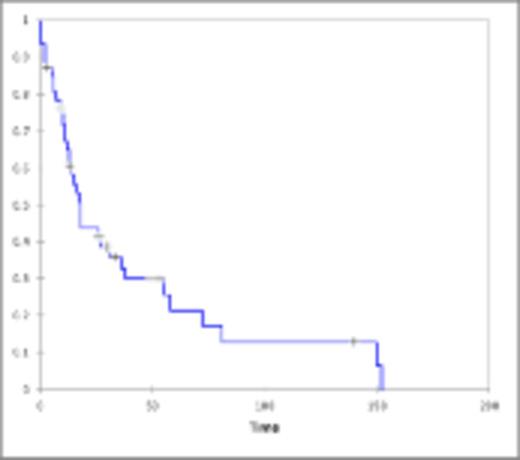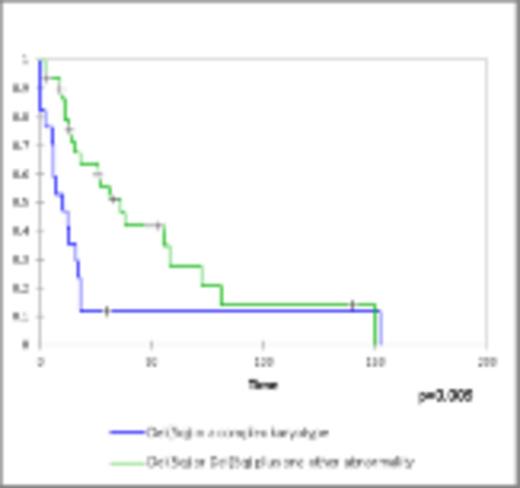Abstract
Introduction
Myelodysplastic Syndromes are diverse group of bone marrow failure syndromes and current treatment options are guided by International Prognostic scoring systems (IPSS and IPSS-R) based on clinical phenotype and cytogenetics. Deletion of long-arm of chromosome 5 is the commonest cytogenetic abnormality and confers distinct biological and clinical implications. A specific subgroup of MDS patients with isolated Del(5q) was described as a separate entity in WHO 2008 classification owing to its unique clinical features, a low risk of leukemic transformation and a relatively good prognosis. Lenalidomide is proven to induce high erythroid response rates (frequently abolishing transfusion requirements) with a median response time of over 2 years in MDS patients with Del(5q). However, with time their anaemia worsens and most patients will become transfusion dependent with subsequent iron overload. Other treatment strategies were explored for those who failed Lenalidomide.
Method
This retrospective multi-centre analysis involved collecting data for MDS patients with 5q abnormalities (isolated Del(5q), Del(5q) with one additional cytogenetic abnormality, or Del(5q) within a complex karyotype) diagnosed between 2006 and 2014 in the Republic of Ireland. Six haematology units participated and the data of 47 patients were available for analysis.
Results
The median age of diagnosis was 72(29-91) with male-female ratio of 1:1.6. A range of WHO subgroups were identified and classic 5q Syndrome was documented in only 6.4% of patients. Cytogenetic results showed 47% isolated Del(5q), 17% Del(5q) plus one other abnormality and 36% Del(5q) in a complex karyotype. Patients with isolated Del(5q) or Del(5q) plus one other abnormality had similar haemoglobin, higher neutrophil and platelet count and lower marrow blasts than those with having a complex karyotype as previously described. IPSS-R scores were available in 37 patients as very low(7), low(8), intermediate(6), high(5) and very high(11). IPSS risks were available for 40 patients as low risk(12), intermediate-1(11), Intermediate-2(8) and high risk(9).
Treatment options included red cell transfusion(85%), Recombinant Erythropoietin(45%), Lenalidomide(17%), Azacitidine(36%), Intensive chemotherapy(7%), transplantation(5%) and others(21%). All 8 patients in Lenalidomide group had either isolated Del(5q) or Del(5q) plus one other abnormality and received a median of 3 cycles (range 1-50). Responses were as follows: stable disease (3,38%), complete response (3,38%), and no response (2,25%). Three patients (38%) became transfusion independent with Lenalidomide.
In 16 patients treated with Azacitidine, 50% had Del(5q) in a complex karyotype and 19% had failed Lenalidomide previously. A median of 10 cycles(range 1-18) were given. Four(25%) patients achieved a complete response, 1(6%) partial response, 1(6%) haematological improvement and 8(50%) stable disease. Response patterns were similar between the two groups with a trend towards improved survival in patients with isolated Del(5q) or Del(5q) plus one other abnormality compared to those with a complex karyotype treated with Azacitidine(23 vs. 15 months, p=0.0862).
Transformation to AML was observed in 44% of patients without any difference between different cytogenetic groups. Median time to AML was 14 months. Median overall survival was 15 months(range <1-152) and 5-year survival was 9.6%. A significant difference in survival was observed between patients with isolated Del(5q) or Del(5q) plus one other abnormality compared to those with Del(5q) in a complex karyotype (26 vs. 10 months, p=0.009).
Conclusions
Irish patients with Del(5q) have similar pattern of disease with previously published data. Only a small proportion of patients were treated with Lenalidomide. Irish patients showed a good response to Azacitidine, even when Lenlalidomide failed and this is an important consideration for selected patients. A high rate of AML transformation was observed in Irish MDS patients with Del5q abnormalities.
(a) Overall Survival of all patients (b) Overall Survival between Patients with isolated Del(5q) or Del(5q) plus one other abnormality compared to patients with complex karyotype including Del(5q)
(a) Overall Survival of all patients (b) Overall Survival between Patients with isolated Del(5q) or Del(5q) plus one other abnormality compared to patients with complex karyotype including Del(5q)
O'Dwyer:Celgene: Honoraria, Research Funding.
Author notes
Asterisk with author names denotes non-ASH members.



This feature is available to Subscribers Only
Sign In or Create an Account Close Modal